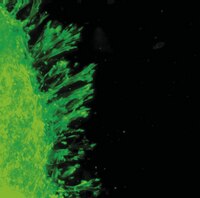ECM505 Sigma-AldrichQCM Chemotaxis Cell Migration Assay, 24-well (3 µm), fluorimetric
The QCM Chemotaxis 3 um 24-well Migration Assay is performed in a Migration Chamber, based on the Boyden chamber principle.
More>> The QCM Chemotaxis 3 um 24-well Migration Assay is performed in a Migration Chamber, based on the Boyden chamber principle. Less<<Recommended Products
Overview
| Replacement Information |
|---|
Key Specifications Table
| Key Applications | Detection Methods |
|---|---|
| ACT | Fluorescent |
| Description | |
|---|---|
| Catalogue Number | ECM505 |
| Brand Family | Chemicon® |
| Trade Name |
|
| Description | QCM Chemotaxis Cell Migration Assay, 24-well (3 µm), fluorimetric |
| Overview | Also available: Cell Comb™ Scratch Assay! Get biochemical data from a scratch assay! Click Here Introduction The CHEMICON® QCM™ Chemotaxis 3 μm 24-well Migration Assay is performed in a Migration Chamber, based on the Boyden chamber principle. The 3 μm pore size of this assay's Boyden chambers is appropriate for studyingleukocyte migration. The quantitative nature of this assay is useful for screening of pharmacological agents. Each kit provides sufficient materials for the evaluation of 24 samples. Cell migration is a fundamental function of normal cellular processes, including embryonic development, angiogenesis, wound healing, immune response, and inflammation. One such process, leukocyte extravasation, is crucial for appropriate and effective immune response. Neutrophils normally exist in a resting state as they circulate though the body. However, upon interaction with small molecules known as chemoattractants, they rapidly respond with endothelial adhesion followed by emigration from the vasculature and chemotaxis to the site of inflammation. These chemoattractant receptors activate heterotrimeric GTP-binding proteins (G proteins) that initiate numerous elaborate signal transduction cascades, culminating in neutrophil migration and activation. Once at the site of inflammation, neutrophils respond with phagocytosis, superoxide generation, and the release of degradative enzymes. Microporous membrane inserts are widely used for cell migration and invasion assays. The most widely accepted of which is the Boyden Chamber assay. However, current methods of analysis are time-consuming and tedious, involving cotton swabbing of non-migrated cells on the topside of insert, manual staining and counting. Recently, a fluorescence blocking membrane insert was introduced to address these issues; however, this approach requires labeling of the cells with Calcein-AM and extensive washing to remove free Calcein before cell migration. The effect of this treatment on cell behavior/migration remains questionable. The Chemicon QCM™ Chemotaxis 3 μm 24-well Migration Assay does not require cell labeling, scraping, washing, or counting. The 24-well inserts and homogenous fluorescence detection format allow for convenient screening and quantitative comparison of multiple samples. In the Chemicon QCM™ Chemotaxis 3 μm 24-well Migration Assay, migratory cells on the bottom of the insert membrane are dissociated from the membrane when incubated with the Cell Detachment Solution. These cells are subsequently lysed and detected by the patented CyQUANT® GR dye (Molecular Probes). This green-fluorescent dye exhibits strong fluorescence enhancement when bound to cellular nucleic acids. Most migration assays utilize an 8 μm pore size, as this is appropriate for most cell types, e.g. epithelial and fibroblast cells. The Chemicon QCM™ Chemotaxis 3 μm 24-well Migration Assay utilizes a 3 μm pore size, which is appropriate for leukocyte migration. The system may be adapted to study different types of cell migration, including haptotaxis, random migration, chemokinesis, and chemotaxis. The Chemicon QCM™ Chemotaxis 3μm 24-well Migration Assay provides a quick and efficient system for quantitative determination of various factors on cell migration, including screening of pharmacological agents, evaluation of integrins or other adhesion receptors responsible for cell migration, or analysis of gene function in transfected cells. |
| References |
|---|
| Product Information | |
|---|---|
| Components |
|
| Detection method | Fluorescent |
| Quality Level | MQ100 |
| Applications | |
|---|---|
| Application | The QCM Chemotaxis 3 um 24-well Migration Assay is performed in a Migration Chamber, based on the Boyden chamber principle. |
| Key Applications |
|
| Biological Information |
|---|
| Physicochemical Information |
|---|
| Dimensions |
|---|
| Materials Information |
|---|
| Toxicological Information |
|---|
| Safety Information according to GHS |
|---|
| Safety Information |
|---|
| Storage and Shipping Information | |
|---|---|
| Storage Conditions | Store kit components at 2° to 8°C, up to the expiration date provided on the kit. |
| Packaging Information | |
|---|---|
| Material Size | 1 kit |
| Material Package | Contains 2 plates sufficient for 24 assays |
| Transport Information |
|---|
| Supplemental Information |
|---|
| Specifications |
|---|
| Global Trade Item Number | |
|---|---|
| Catalog Number | GTIN |
| ECM505 | 04053252365492 |
Documentation
QCM Chemotaxis Cell Migration Assay, 24-well (3 µm), fluorimetric SDS
| Title |
|---|
References
| Reference overview | Pub Med ID |
|---|---|
| T-cell function and migration. Two sides of the same coin. von Andrian, U H and Mackay, C R N. Engl. J. Med., 343: 1020-34 (2000) 2000 | 11018170
 |
| Transmembrane motility assay of transiently transfected cells by fluorescent cell counting and luciferase measurement. Gildea, J J, et al. BioTechniques, 29: 81-6 (2000) 2000 Show Abstract | 10907081
 |
| Wound healing--aiming for perfect skin regeneration. Martin, P Science, 276: 75-81 (1997) 1997 Show Abstract | 9082989
 |
| Molecular events in neutrophil transepithelial migration Parkos, C A Bioessays, 19:865-873 (1997) 1997 | 9363680
 |
| Transient functional expression of alphaVbeta 3 on vascular cells during wound repair. Clark, R A, et al. Am. J. Pathol., 148: 1407-21 (1996) 1996 Show Abstract | 8623913
 |
| To stick or not to stick: the new leukocyte homing paradigm. Dunon, D, et al. Curr. Opin. Cell Biol., 8: 714-23 (1996) 1996 Show Abstract | 8939652
 |







